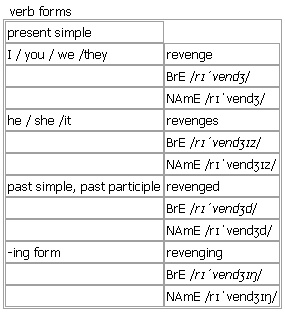|
Từ điển Oxford Advanced Learner 8th
 revenge
revenge

re·venge [revenge revenges revenged revenging] noun, verb BrE [rɪˈvendʒ] NAmE [rɪˈvendʒ]
noun uncountable
1. something that you do in order to make sb suffer because they have made you suffer
•He swore to take (his) revenge on his political enemies.
•She is seeking revenge for the murder of her husband.
•The bombing was in revenge for the assassination.
•an act of revenge
•revenge attacks/killings
2. (sport)the defeat of a person or team that defeated you in a previous game
•The team wanted to get revenge for their defeat earlier in the season.
Word Origin:
late Middle English: from Old French revencher, from late Latin revindicare, from re- (expressing intensive force) + vindicare ‘claim, avenge’.
Thesaurus:
revenge noun U
•He swore to take revenge on his enemies.
retaliation • |formal vengeance • |written reprisal •
revenge/retaliation/vengeance/reprisals for sth
in revenge/retaliation/vengeance/reprisal
take revenge/vengeance on sb
want/vow/swear/exact/wreak revenge/vengeance
Which word? Revenge is the most general of these words. It often refers to a personal act that is done in response to sth that has been done to you personally. Retaliation and reprisals are often taken by a group, such as a military force, against another group who may not be responsible for the first crime
•They fear reprisals against aid workers in the region.
Vengeance is extreme, violent and often personal.
Example Bank:
•He vowed to take his revenge on the man who had killed his brother.
•Revenge is sweet, so they say.
•She desperately wanted to take revenge on her attacker.
•The accusations were driven by a desire for revenge.
•The attack was in revenge for the deaths of two loyalist prisoners.
•The bombing was an act of revenge for the shooting of two young boys.
•This was sweet revenge for our defeat earlier in the season.
•revenge for the insult
•taking revenge on her attacker
•He swore to take revenge on his political enemies.
•His death set off a series of revenge killings.
•The team wanted to get their revenge for their defeat earlier in the season.
•There were television appeals that acts of revenge should cease.
Derived: ↑revenge yourself on somebody ▪ ↑revenged on somebody
verb
Verb forms: 
Word Origin:
late Middle English: from Old French revencher, from late Latin revindicare, from re- (expressing intensive force) + vindicare ‘claim, avenge’.
Grammar Point:
avenge / revenge
Avenge is a verb; revenge is (usually) a noun.
People avenge something or avenge themselves on somebody: ▪ She vowed to avenge her brother’s death. ◇ ▪ He later avenged himself on his wife’s killers. You take revenge on a person.
In more formal or literary English, revenge can also be a verb. People revenge themselves on somebody or are revenged on them (with the same meaning): ▪ He was later revenged on his wife’s killers. You cannot revenge something: She vowed to revenge her brother’s death.
|
|
|
▼ Từ liên quan / Related words
Related search result for "revenge"
|
|
